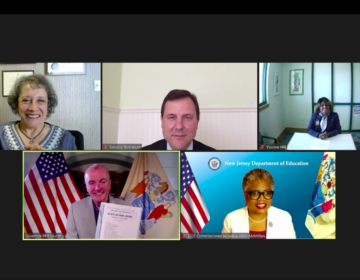The next generation of American voters must learn to decipher fact from fiction
Olga Polites, a high school English teacher, makes the case for mandating media literacy in public schools.

FILE - In this Wednesday, Jan. 6, 2021 file photo, supporters of President Donald Trump participate in a rally in Washington. (AP Photo/John Minchillo)
“Murder the media.”
Those horrifying words were carved into a door at the Capitol Building in Washington, DC, during the Trump-inspired insurrection on January 6th.
While many images from that infamous day are seared into my memory, those words have me thinking about how educators like myself prepare students to be productive and responsible citizens. The fact that someone would write “Murder the media” at a symbol of our democracy indicates that we have a great deal of work ahead of us.
The first thing we need to talk about is how people get their information. We know that social media has disrupted how citizens get their news. But it also hampers one’s ability to critically read and comprehend information.
Many people rely on their Facebook and Twitter feeds for news rather than credible new sources, such as the Associated Press or their local newspaper.
The disinformation campaign regarding the legitimacy of the 2020 presidential election is a clear indication of the damage wrought by bad actors in the conservative media – people such as Fox News’ Tucker Carlson and Sean Hannity, and radio hosts Rush Limbaugh and Mark Levin.
The fact that so many Americans believe lies about widespread voter fraud speaks to the urgent need to increase media literacy. While it may be too late to provide a significant portion of the adults with the skills to be better consumers of news, there’s still time to educate millions of middle and high school students throughout the United States.
The very first skill that must be taught is how to gather facts.
Yale history professor Timothy Snyder recently wrote this in The New York Times: “Without agreement about some basic facts, citizens cannot form the civil society that would allow them to defend themselves. If we lose the institutions that produce facts that are pertinent to us, then we tend to wallow in attractive abstractions and fictions.”
Synder went on to write: “Post-truth wears away the rule of law and invites a regime of myth.”
How can we ensure that today’s adolescents, who will be tomorrow’s voters, will not fall into this myth-making world? The answer is mandating information and media literacy in public education. The News Literacy Project and Media Literacy Now, both American non-profit organizations, have free resources available for teachers and parents.
For those who fear this will undermine independent free thought among students, these resources aren’t about indoctrinating a particular viewpoint. It’s about giving them the tools to evaluate sources and content; it’s about introducing them to news wire services such as the Associated Press and Reuters, and trusted newspapers such as The Philadelphia Inquirer and The Washington Post. It’s about highlighting the differences between news and opinion, and teaching our youth and how to use fact-checking websites, such as snopes.com and factcheck.org. It’s also about students reading E.J. Dionne, a liberal columnist, and George Will, a conservative columnist.
Our young people should know that The Nation is a left-leaning magazine, the National Review is a right-leaning publication, and Infowars and The Daily Caller are not credible at all because they traffic in lies and conspiracy theories.
These basic skills might enable students to understand when a U.S. president is lying about a stolen election, and why white insurrectionists were treated so differently than Black Lives Matter protesters.
If we want democracy to work, students must learn that the news media is not the enemy. Otherwise, the myth-making will continue, and we’ll have the next generation of post-truth adults who are capable of carving “Murder the media” into our Capitol.
As Thomas Jefferson once said: “were it left to me to decide whether we should have a government without newspapers or newspapers without a government, I should not hesitate a moment to prefer the latter.”
Olga Polites is a high school English teacher at Cherokee H.S. in Marlton, New Jersey, and an adjunct instructor of composition at Rowan University.

Get daily updates from WHYY News!
WHYY is your source for fact-based, in-depth journalism and information. As a nonprofit organization, we rely on financial support from readers like you. Please give today.



